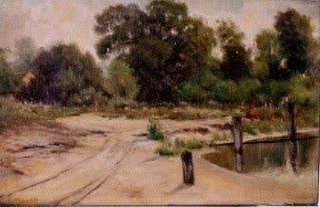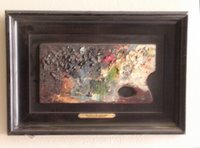Auf Wiedersehen, Herr Mauch

Carl Mauch was the first president of the P&C. One of his old drawings, "At the Circus," hangs in the club. Mauch was one of the speakers in the P&C's art lecture series that ran between 1908 and 1910; he spoke on the art of Greece.
Mauch was born in Stuttgart, Germany in 1854. At the age of 16, he was conscripted into serving in the German army in the Franco-Prussian war of 1870 to 1871. He studied in Munich, Paris and Berlin before immigrating to the United States, where he worked as a commercial artist. Mauch was one of the founders of the P&C and also was one of the first painters to colonize Brown County, Indiana and Saugatuck, Michigan.
Mauch died in June, 1913. Aged 63, he had gone nearly blind.
His death was noticed in the club's newsletter of July 1913, where it was written of him: "Fiery and at the same time gentle in disposition, Carl Mauch was invincible in his adherence to what he felt was right. In his death, the Club loses a father, and the world gives up a true artist, a brave soldier and an upright man." Those words appeared below this sketch done by Frank Holme, "made by Holme in the Club rooms many years ago":

The club newsletter fails to mention that Mauch was a suicide. He took poison (one newspaper reported that the poison was potash) and was found in bed by his wife. He was 63.
According to the Chicago Tribune of June 19, 1913, Mauch was nearly blind at the time of he killed himself.
The artist--he was 63 years old--was found dead in bed at his home at 2651 Mildred avenue yesterday morning by his wife. . . .The Chicago Examiner adds more details of Mauch's death:
"I was talking to him just the other day," said a member of the Palette and Chisel club, "and he told me of the picture he had always hoped to paint. He was enthusiastic, and suddenly I saw his lips tremble. It was only for a second, though, and then he smiled.
"'Tough on an old soldier to be so helpless,' he said, and I questioned him, for this was utterly unlike the old man. He had been having trouble with his eyes andn would never again put brush on canvas. The picture he had conceived after years of dreaming had died unborn."
Quietly he piled together his many rough sketches and trials at color, put lovingly aside his palette and brushes, wrote a farewell letter to his wife, and took a draught of poison.Mauch had retired at age 58 after a "career that many men would have regarded as successful." He made an "excellent income" as a commercial artist, "[b]ut Carl Mauch was not to be satisfied with commercial success. He sometimes confided to his friends that he feard he lacked the 'divine fire' to create a work that demands recognition. More and more he brooded upon this until he determined to give up all commercial work and devote himself to the creation of his dreamed picture. Little by little he came to realize that this must always remain a dream."
Mrs. Mauch, who came from Germany thirty-seven years ago to join her girlhood sweetheart, found her husband dead in his room at their home. . . She did not need the letter to know that a blasted ambition had led to the suicide.


0 Comments:
Post a Comment
<< Home